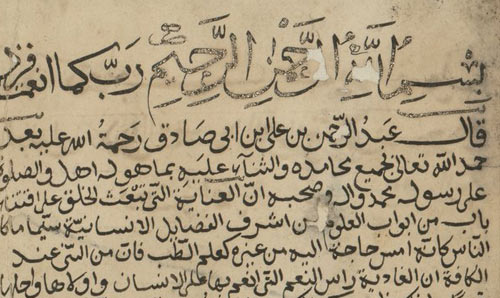John Rylands Research Institute and Library projects
Some of the most precious items in the Rylands are included in the Medieval and Early Modern Collections.
With more than 500 Latin manuscripts, 41 manuscripts in Middle English, and 4,500 incunables (books printed before 1500), the collection documents the material history of communication. It was built up largely from purchases from the Crawford and Spencer families.
Notable pieces include:
- A copy of Gutenburg’s Bible to elaborately illuminated religious Latin manuscripts
- Early works in English by Chaucer and John Lydgate
- A significant holding of 15th-century blockbooks
- The collection provides a primary resource for the MA in Medieval and Early Modern Studies; some classes take place in the Rylands and offer students a first-hand opportunity to engage with the works.
The Centre for Medieval and Early Modern Studies (MEMS) works in close conjunction with the John Rylands Research Institute and Library with its Medieval and Early Modern Collections research.
Current Rylands research projects

Professor Peter E Pormann, Professor of Classics and Graeco-Arabic Studies, is principle investigator on a project entitled: 'The Syriac Galen Palimpsest: Galen's On Simple Drugs and the Recovery of Lost Text through Sophisticated Imaging Techniques'.
The Syriac Galen Palimpsest Project is a unique large-scale project focusing on the study of one particular medieval manuscript containing a Syriac translation of Galen's main pharmacological treatise, 'On Simple Drugs', as a lower erased layer (an undertext) of approximately the ninth century. It is overwritten by another Syriac text of a different nature, Melkite liturgical hymns called canons, presumably of the eleventh century. The manuscript is of utmost importance as a substantial evidence to the role that the Syriac translations played in the process of universal transmission of the Classical knowledge in general and Galen's medical and pharmacological legacy in particular. The project description gives further details on the research conducted by Professor Pormann and his team.
Research Associate Grigory Kessel is working on a project that aims to produce the first critical edition and translation of the so-called 'Syriac Epidemics'.
The 'Syriac Epidemics' is a commentary on book six of the Hippocratic 'Aphorisms' and is by far the largest extant Syriac medical treatise surviving from the pre-Islamic period, and an invaluable witness to the fact that Syriac medicine was influenced by late Alexandrian medical tradition. Despite its importance to the study of the transmission of classical medicine, the Syriac Epidemics remains relatively unknown, even among specialists. The project will improve our understanding of late antique Alexandrian medicine, offer a glimpse into the lost works of the iatrosophist Gesius, and generate awareness of the transmission of classical medicine to the East and of its effect on the Islamic medical tradition. The project is supported by the Wellcome Trust.
